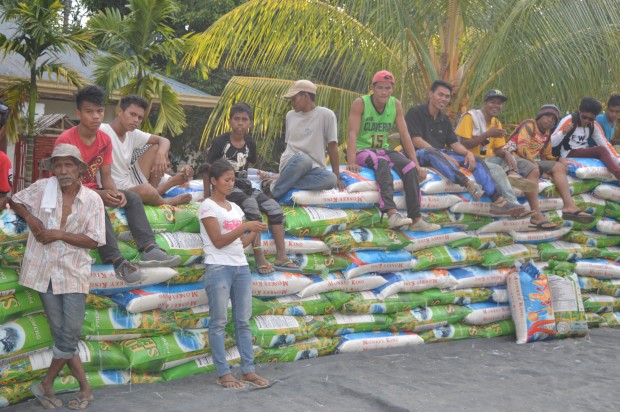
In this April 2 file photo, protesters sit on the files of bags of rice inside the United Methodist Church in Kidapawan City. Action star Robin Padilla visited the protesters on Saturdat afternoon and donate at least 200 bags of commercial rice to the hungry protesters. WILLIAMOR MAGBANUA
GOVERNMENT agencies have around P50 billion in funds that could be used to mitigate hunger in Kidapawan and other places hit by the El Niño dry spell, noted Sen. Loren Legarda, chair of the Senate committees on Finance and Climate Change on Friday.
“You are awash in cash. Why don’t you give it to the people who need it the most? Why is it not being spent? Why do farmers have to go hungry and get killed while demanding help?” Legarda asked a panel of agriculture and economic planning officials.
Breaking the Senate recess, Legarda called for a finance committee meeting on Friday in the wake of the violent dispersal of protesting farmers in Kidapawan City on April 1, which resulted in the death of three protesters and injuries to scores of others.
In attendance were officials of the Department of Agriculture, Department of Social Welfare and Development, Department of Budget and Management, Department of Interior and Local Government, Department of Environment and Natural Resources, Climate Change Commission, National Food Authority, National Disaster Risk Reduction and Management Council (NDRRMC), and the National Economic and Development Authority (Neda).
Legarda gave the government officials a dressing down for failing to bring timely interventions to farmers considering that funds were available.
“Ang bagal-bagal ng gobyerno. ’Di pwedeng mabagal tayong lahat. (The government is so slow. We can’t all be that slow),” said Legarda.
The senator cited the estimated P50-billion in combined available savings and quick response funds (QRF) of the Departments of Agriculture, Social Welfare and Development, and the NDRRMC from last year to the current budget.
This includes government’s disaster risk reduction fund of P43 billion for 2016 and P5 billion in savings from 2015; DA’s P496.6 million in QRF for 2016 and a balance of P11.9 million from 2015, and the DSWD’s P1.6 billion QRF for this year and the remaining P703.6 million in savings from last year.
“You have not rolled out (projects) and, meanwhile, people are getting killed. Where are these billions from 2015 and 2016?” said Legarda, at one point pounding the table.
“That’s really deplorable. Only in this country do you shoot the hungry,” said Legarda.
She assailed the myopic leadership of “imperial Manila, the imperial central government” for failing to bring help to farmers in far-flung areas when discussions and preparations for the dry spell began as early as 2014.
“Bakit kayo tipid nang tipid eh ang laki ng pondong hiningi sa amin? (Why do you keep saving when you asked us for huge funds?) I don’t see the point unless you did not know they needed it, which is impossible because we’ve been talking about it since 2014,” said Legarda.
But Neda Director General Emmanuel Esguerra, among those invited to the meeting, said the government’s assessment of its El Niño interventions was positive, as there has been no food shortage, food prices have remained stable, and there has be no outbreak of diseases despite limited water supply in certain areas.
“Government has been able to successfully mitigate the impact of El Niño…But despite these encouraging numbers, we recognize there could be areas feeling the heavier impact of El Niño,” said Esguerra.